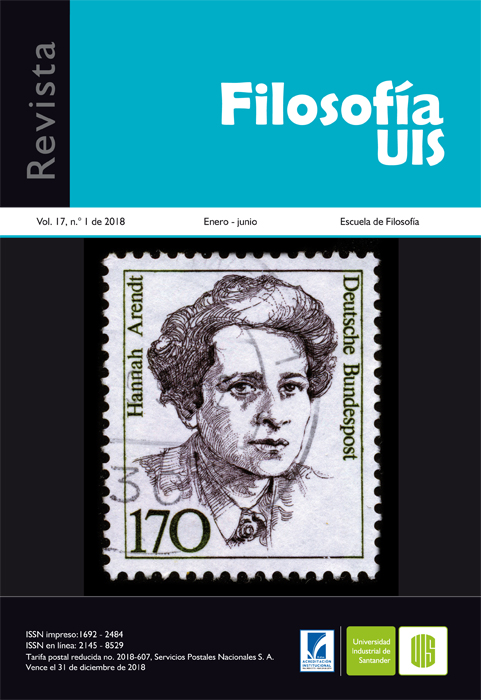The philosophical rupture of Hannah Arendt
Published 2018-05-15
Keywords
- thinking,
- reflective judgment,
- politics,
- opinion,
- discernment
How to Cite
Copyright (c) 2018 Revista Filosofía UIS

This work is licensed under a Creative Commons Attribution 4.0 International License.
Abstract
The purpose of this article is to know the essence of reflexive judgment, based on the studies developed for Hannah Arendt, who revised its minimum elements for the importance in the community building. Project developed from the academic journey that she developed about this concept, visualizing the two definitions, the first was to describe before the judgment of a Lieutenant Colonel Nazi and its modification was after this judicial process. Conceptual evolution will make it possible to identify why reflexive judgment is so important to achieve life in society.
Downloads
References
Arendt, H. (2009). La condición humana. Buenos Aires: Paidós.
Arendt, H. (2012). Conferencias sobre la filosofía política de Kant. Barcelona: Paidós.
Arendt, H. (2013). Eichmann en Jerusalén. Bogotá: Editorial de Bolsillo.
Botero, A. y Granobles, Y. (2013). El mal radical y la banalidad del mal: Las dos caras del horror de los regímenes totalitarios desde la perspectiva de Hannah Arendt. Revista Universitas Philosophica, (60), 99-127.
Couto-Soares, M. (2006). Ensayo juicio político y presunción de verdad notas sobre el pensamiento político de Hanna Arendt. Anuario Filosófico, XXXIX(3), 693-719.
Kant, I. (1914). Crítica del juicio. Madrid: Espasa-Calpe.
Órdenez Azúa, P. (2013). Breve análisis comparativo de los juicios estéticos sobre lo bello y lo sublime en Crítica de la Facultad de Juzgar. Revista Internacional de Filosofía 2(2), 65-80.
Rivera De Rosales, J. (2005). Kant y Hannah Arendt. La comunidad del juicio reflexionante. Ideas y valores, (128), 3-4.
Sahui Maldonado, A. (2002). Ensayo Hannah Arendt: espacio público y juicio reflexivo. Centro de Investigaciones Jurídicas. Signos filosóficos, (8), 241-263.
